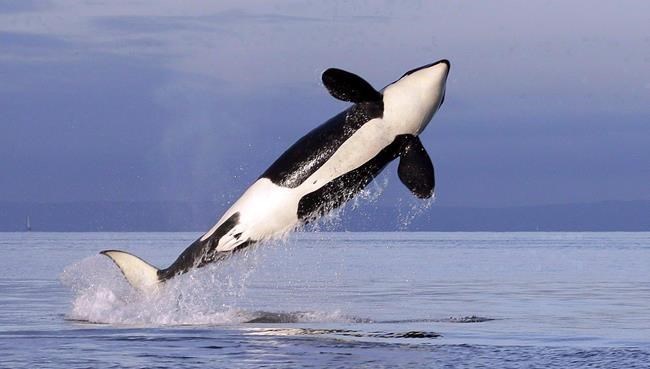The federal government is spending more than $9.1 million to develop and test technologies that alert vessels to the presence of whales, lowering the risk of collisions.
Fisheries and Oceans Minister Dominic LeBlanc says the government will also spend more than $3.1 million on four research projects to help protect endangered southern resident killer whales.
The University of British Columbia will examine how the whales have been affected by changes in the supply and quality of chinook salmon, its source of food. Another study by Ocean Wise will assess the impact environmental stressors are having on the whales, particularly noise and limits on prey.
Researchers at the University of Victoria will study the impacts of ocean noise on orcas and chinook salmon.
Francis Juanes, a fisheries ecologistat UVic, said the impact of noise on the marine environment has only recently been acknowledged.
“The importance of noise hasn’t been recognized in the past and it hasn’t really been studied,” he said. “That is why this is so very exciting.”
He said the UVic project will take a three-pronged approach, looking at the effects of marine noise on orca communication and on salmon, and tracking and measuring small-boat noise.
His own research will investigate the effects of noise on chinook salmon, a favourite food of the southern resident orcas and also a species in recent decline. He will study how salmon react to a variety of noise, including sounds of orca whale, over a variety of background noises.
Another UVic researcher will deploy marine microphones to investigate how orca communications, their clicks and squeals, are affected by the noise levels. Orcas use echo-location to catch food, bouncing high-frequency sounds off their prey as bats do in the air.
The other area of research is the generation of marine noise by small boats. Juanes noted small boats might be having an acute effect on orcas. After all, people in B.C. take their pleasure craft out in the summer, a season when orca are active.
“There are a ton of small vessels in the area, particularly in the summer,” he said. “That overlaps with the orcas, when the whales are here.”
LeBlanc said Thursday there is a responsibility to ensure whales are protected for future generations.
Several conservation groups recently said the federal government’s failure to issue an emergency order reducing threats to southern resident killer whales off the B.C. coast ahead of fishing and whale-watching season could mean the species’ extinction. They have called for action including establishing priority foraging refuges, restricting fisheries and setting lower speed limits for vessels.
LeBlanc said the government is not planning to stick only to studies and suggested there would be more announcements in coming weeks.
There are 76 southern resident killer whales left and the groups said they have up to a 50 per cent chance of disappearing in the next century. The population has declined from a high of 98 in 1995.
Hussein Alidina, lead specialist in ocean conservation with the World Wildlife Fund Canada, said LeBlanc’s announcement of more research and development is not enough.
“It doesn’t provide the kind of action we need immediately to recover the orcas,” he said.
He said the orcas will need to see concrete actions, such as limiting whale watching when they are foraging, and other specific measures within the next two to three months to make it in time for the chinook feeding season in the Salish Sea.
The species has been listed as endangered for more than 16 years, he said, and little action has been taken since Canada created a plan 14 years ago.
“We waited 14 years for an action plan and we’re still struggling to get action,” Alidina said. “It’s kind of ridiculous to see how slow things are here. We need to do better — we have a responsibility to do better.”



